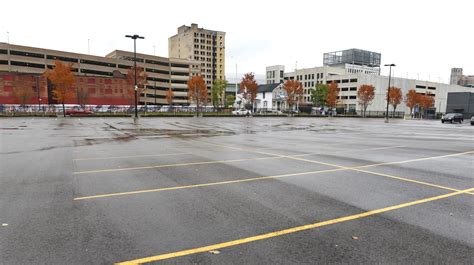Detroit has long struggled with high property tax rates, low property values, and insufficient City funding for critical services like public transportation. Mayor Duggan has proposed one way to start addressing those challenges – a new Land Value Tax (LVT). Property taxes would be assessed separately for the land and for the developed buildings on it:
- Property taxes for the buildings would decrease, thus lowing taxes for the vast majority of homeowners.
- Taxes on the land itself would be increased, raising taxes paid by owners of vacant property, surface parking lots, vacant lands, slums, and other underdeveloped property. This would simultaneously raise revenue for the City while encouraging redevelopment of those underutilized properties.
While far from a silver bullet to Detroit’s complex challenges, anything that encourages redevelopment of underutilized property while decreasing costs for homeowners is a positive step for Detroit. TRU recently urged Michigan Legislators to enable Detroiters to vote on this change:
A Support Letter to House Leadership
To the Honorable House Speaker Joe Tate,
On behalf of Transportation Riders United, our hundreds of members, and the thousands of people who ride Detroit area public transit each day, I urge your support for the Land Value Tax (LVT) legislation currently under debate.
We are excited about the potential of the LVT to encourage denser, more productive development in the city, while also saving money for homeowners. It is very challenging for a transit agency to effectively serve such a sprawled-out city with so much underdeveloped land, as Detroit’s Department of Transportation (DDOT) does each and every day. And it’s less safe for bus riders to wait or walk by vacant lots and underdeveloped property.
Yet current taxation encourages speculators, parking lot owners, and others with underdeveloped land to just sit on it and wait for its value to increase, regardless of the negative impacts that may have on neighbors and the broader community.

If voters choose to adopt the LVT, owners of parking lots and other underdeveloped land will finally be required to pay (closer to) their fair share of city costs. Disincentivizing surface parking lots in downtown Detroit and elsewhere will also make those areas more walkable and more attractive and will encourage more people to utilize transit instead of driving.
Transit is most effective, most convenient, and most productive in areas with higher density and less underdeveloped land. Supporting transit-appropriate land development is just one more benefit to the LVT proposal.
As you likely know, Transportation Riders United is a Detroit-based nonprofit with twenty years of experience educating, advocating, and mobilizing for better public transit and other affordable sustainable mobility options. We partner with organizations throughout the City, region, and state, including business, education, disability rights, environmental, senior, social service, and health groups, who all agree that improving transit is essential for Detroit to thrive.
Because of the broad and varied benefits of public transit and because of the potential for LVT to encourage denser development in Detroit, we urge you to support the LVT and do everything you can to pass it. Please don’t let it be watered down such as to opt-out parking lots. If possible, please make the amount of LVT that can be raised as large as can be.
Thank you for your consideration of our input and for everything you do to support the City of Detroit and the State of Michigan.